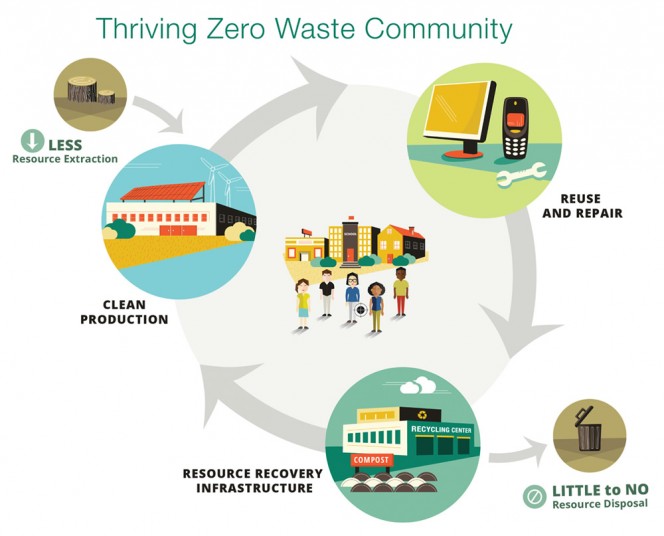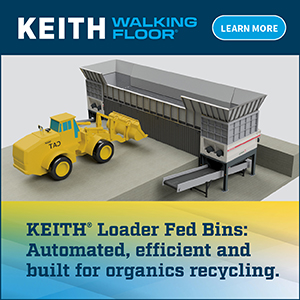No one has all the answers yet, but we know enough now to help any community in the U.S. make serious strides toward a Zero Waste future.
Eric Lombardi and Kate Bailey
BioCycle November 2015
The early adopters of the Zero Waste movement in the U.S. — Seattle, San Francisco and Oakland, to name a few — have had their hands full as the pioneers trying to shift from waste management to resource management. Their work has paved the way for much of the success we see today in the U.S., including 45 communities with Zero Waste plans/goals and 200-plus communities composting food scraps from residents.
No one has all the answers yet, but we know enough now to help any community in the U.S. make serious strides quickly toward a Zero Waste future. And that’s critical, because we don’t have time for 25 year goals. As a nation and world, we need to stop wasting and start recovering materials quickly, prevent greenhouse gas emissions immediately, and redesign our community systems for sustainability now.
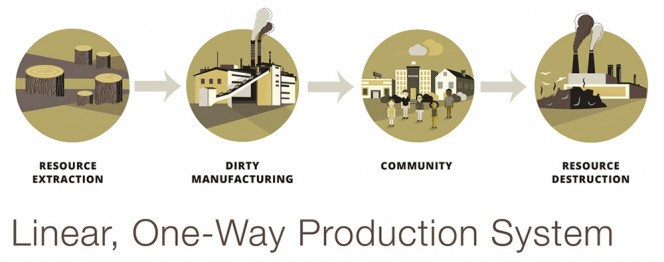
Zero Waste is one of the fastest, easiest and most cost-effective local solutions to tackle some of the greatest environmental, social and economic challenges facing our planet. Whether you’re passionate about building healthy soils, keeping plastics out of the ocean, mitigating climate change or creating green jobs, Zero Waste can support your goals.
The question now is how to get communities started and moving toward Zero Waste as quickly as possible to realize all these benefits. Eco-Cycle created the Eco-Cycle Solutions Hub as the platform to do just that, to help every community in the U.S. use the tools and lessons learned by other Zero Waste pioneers to speed toward Zero Waste within a 10-year time frame. It’s an evolving platform to support the growing movement as we all collaborate to refine the vision and tools for building a Zero Waste economy. Communities wanting to take action don’t need to reinvent the wheel — they need to plug into the incredible work that’s already happening across the country (and the globe) and connect with the peers and experts who have helped make that change happen.
The Eco-Cycle Solutions Hub is not about individual consulting or getting on a plane to start the revolution town by town. The Hub leverages what is already collectively known and making that accessible in cyberspace to every community looking to move the needle. It’s built for those local champions who make change happen on the ground — government staff, elected officials, citizens, businesses and organizations in every community — and backed up by Eco-Cycle’s 40 years of grassroots, hands-on experience in creating Zero Waste services for every sector of our Boulder County, Colorado community.
Vision, Roadmap, Tools And Engagement
Four key elements are needed to move a community toward Zero Waste: An inspiring and well-communicated vision; A pragmatic strategy; Tools and resources to take action; and Community engagement to energize and sustain the vision over time.
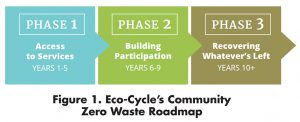
After a community adopts its Zero Waste vision, a roadmap is needed to know where it is going on the journey. Eco-Cycle’s Community Zero Waste Roadmap is a high level overview of the key infrastructure, policies and programs that have been proven to work in every community that is seriously pursuing a Zero Waste goal. The Roadmap is laid out as a three-phase, 10-year plan (Figure 1) to recover 90 percent of the discards in a community and to reduce waste at the source. This simplified Zero Waste plan is accessible to every community, no matter where it is located.
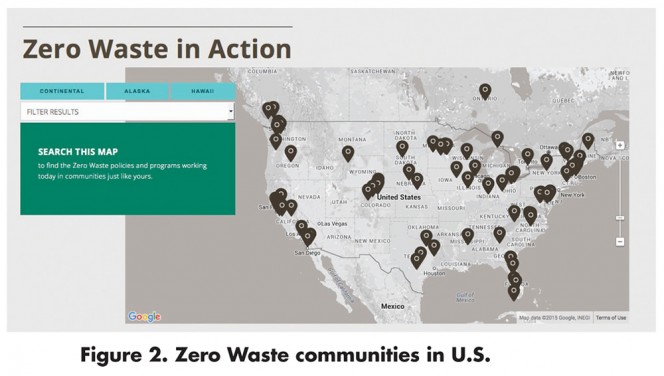 A separate searchable map (Figure 2) supports the Roadmap with real-world examples from U.S. communities — from the cutting-edge models of Seattle or San Francisco to middle America communities like Griffin, GA; Cleveland, OH; Teton County, WY; and Oberlin, OH. Users can find which communities near them, or like them, have disposal bans, mandatory recycling and more. And as more communities launch their Zero Waste plan, they can help populate the map — making this a better resource by sharing the success stories in order to collaboratively grow the knowledge base.
A separate searchable map (Figure 2) supports the Roadmap with real-world examples from U.S. communities — from the cutting-edge models of Seattle or San Francisco to middle America communities like Griffin, GA; Cleveland, OH; Teton County, WY; and Oberlin, OH. Users can find which communities near them, or like them, have disposal bans, mandatory recycling and more. And as more communities launch their Zero Waste plan, they can help populate the map — making this a better resource by sharing the success stories in order to collaboratively grow the knowledge base.
For the past two years, WasteCap Nebraska has used Eco-Cycle’s Community Zero Waste Roadmap to lay the groundwork to move five Nebraska communities — Wayne, Imperial, Hastings, Broken Bow and Louisville — toward Zero Waste. The Roadmap was especially valuable in helping WasteCap create a vision for each community of where they needed to go in initial meetings with key players, such as city managers, mayors, and citizen advocates.
Project results are exciting so far, as shown in these examples:
Hastings passed the first Zero Waste resolution in Nebraska and is one of the first in the Midwest. It calls for the city to create a Zero Waste plan and recognizes the opportunity for the local government to lead by example.
Wayne set a Zero Waste goal in its community comprehensive plan, aiming for 90 percent resource recovery through a 10-year strategic plan. The town prioritized public-private partnerships to develop Zero Waste infrastructure and services.
Each of the communities is actively working to implement new programs and services including curbside recycling, pay-as-you-throw (PAYT) pricing and food waste composting.
Much of WasteCap’s success in Nebraska has come from its ability to build a partnership between citizen and government leaders. WasteCap has successfully engaged with city managers, mayors, city councils, city administrators, citizen advocates and green teams in its target communities. In late 2014, Eco-Cycle led a workshop for these key players that helped to prioritize local actions and understand each other’s role in creating change.
Inside-Outside Partnerships
Moving toward Zero Waste is more than just a vision, a plan and a series of tools. Community engagement is paramount, and it starts with understanding everyone’s role and how to find the right partners. Many recycling and reuse initiatives come about because of a single person. We are all thankful to those champions, but when it comes to large-scale community-wide change, one person isn’t enough. Even government doesn’t have the power to build a Zero Waste community by itself.
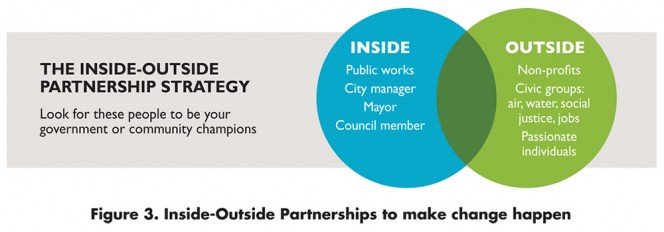 Eco-Cycle has participated in communities where systemic change was accomplished on short timelines and with the greatest reach. It comes as a result of an action strategy that fully engages both citizens and public officials. This action strategy is called the “inside/outside partnership” (Figure 3). The “inside” champion is from the public sector (either staff or elected), and the “outside” champion is a citizen or citizen group. This partnership is the key in any community to both launching Zero Waste initiatives and sustaining long-term change. The Hub offers a Community Organizing Guide to help a small handful of citizens find and collaborate with each other, and then work with government to implement specific Zero Waste initiatives.
Eco-Cycle has participated in communities where systemic change was accomplished on short timelines and with the greatest reach. It comes as a result of an action strategy that fully engages both citizens and public officials. This action strategy is called the “inside/outside partnership” (Figure 3). The “inside” champion is from the public sector (either staff or elected), and the “outside” champion is a citizen or citizen group. This partnership is the key in any community to both launching Zero Waste initiatives and sustaining long-term change. The Hub offers a Community Organizing Guide to help a small handful of citizens find and collaborate with each other, and then work with government to implement specific Zero Waste initiatives.
Lafayette, Colorado
An example of an inside-outside partnership is the curbside recycling program in Lafayette, Colorado. Trash and recycling services in most Colorado communities are provided by private haulers with no oversight from the local government. This means residents who want to recycle must pay to subscribe to a recycling service and there can be several different companies driving trash and recycling trucks up and down the same street every day.
Lafayette residents wanted a better option that gave everyone easy access to, and created financial incentives for, recycling, and that reduced truck traffic on the streets. For city staff, this was a matter of competitive pricing and equity. About half of the households in Lafayette are in homeowners association (HOA) neighborhoods that were getting a better deal on their trash and recycling services because they contracted with a single hauler. And this service gap cut across cultural lines: HOA neighborhoods have a more affluent, white population while the rest of town has a higher percentage of lower-income, Hispanic residents.
Even though the effectiveness of a single-hauler contract was well established in HOAs and in other states, the idea had been soundly defeated by Lafayette’s neighboring town a few years earlier because of vocal push-back from the haulers and a few residents. If this was going to work in Lafayette, strong public support was needed.
With technical support from Eco-Cycle, 15 concerned citizens came together and formed a grassroots group called Lafayette Recycles. Through letters to the editor, house meetings and other grassroots campaigning, Lafayette Recycles got the community excited and involved — more than 100 citizens showed up to a big public meeting on recycling.
Lafayette Recycles also worked closely with City Council and city staff to be transparent in its goals and vision. Through coffee shop meetings with each council member, the group explained the initiative, answered questions, discussed the widespread support for recycling and helped city council members understand the opposition. As predicted, there were misleading letters from local trash haulers to protest the proposal and a few angry residents who didn’t want to have to use a single company. But the recycling campaign prevailed because of the overwhelming community support: more than 70 residents attended the decisive City Council meeting, helping to champion a solution that brought the greatest good to the greatest number.
The Lafayette City Council, staff and community have been extremely happy with their curbside recycling program. In 2014, the inside-outside partnership strategy was engaged again to implement a new curbside composting collection program for the community.
Waste planning with an attitude
Zero Waste is not just a West Coast ideal or a big city thing. It is being embraced by communities across the U.S. — large and small, urban and rural. The Eco-Cycle Solutions Hub can help all these communities come together, learn, share, and then take the next step forward. The goal is to see hundreds of communities pledge to pursue Zero Waste over the next five years and to connect them with each other through a knowledge-sharing network in cyberspace.
Beyond the pledge, the Hub wants to see communities move away from traditional solid waste plans and instead create Zero Waste plans. Changing that one word makes all the difference. Eco-Cycle’s Community Zero Waste Roadmap is the first step toward making Zero Waste planning accessible to every city and town. Collectively, the Roadmap can be made into a living blueprint for a sustainable, thriving community. There’s something for everyone in that vision.
Zero Waste is a cost-effective, ready to implement local solution to immediately reduce greenhouse gas emissions, create green jobs, reduce air and water pollution, and invest in healthy soils. Every community needs to get moving. And help us stay abreast of best practices and new ideas and opportunities growing out of the incredible work happening every day toward Zero Waste by joining us at www.EcocycleSolutionsHub.org. m
Kate Bailey is the Program Director for Eco-Cycle International. Eric Lombardi led Eco-Cycle in Boulder for many years prior to launching Eco-Cycle International. Eco-Cycle thanks WhiteWave Foods Company for its support as the Founding Partner of the Eco-Cycle Solutions Hub.



